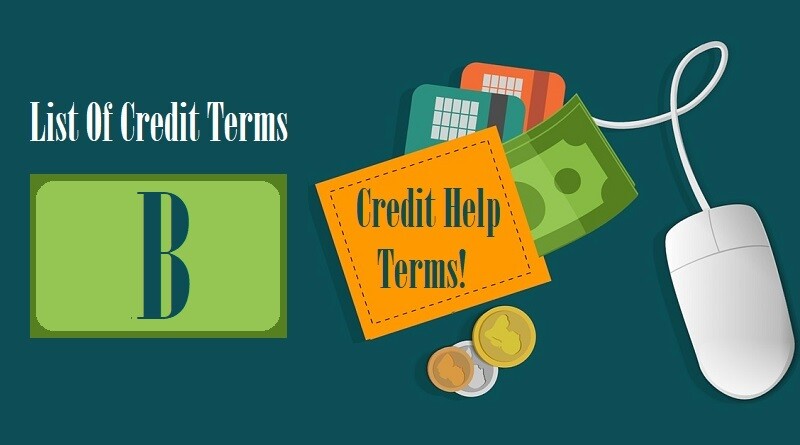
List Of Credit Terms B
Confused By The Credit Terms?
Our glossary of credit terms will help you learn the most common financial terms, words and phrases, as well as the meaning for dozens of legal and credit terminology terms alphabetically.
A |
B |
C |
D |
E |
F |
G |
H |
I |
J |
K |
L |
M |
N |
O |
P |
Q |
R |
S |
T |
U |
V |
W |
X |
Y |
Z
B
Bad Debt – A debt that a lender has determined the borrower is not going to repay.
Balance – The total amount of money owed on a loan or credit account, or the total amount of money in a checking or savings account. In the case of a credit card, it includes any unpaid balance from the previous month, new purchases, cash advances, and any charges such as an annual fee, late fee, or interest.
Balance Transfer – Moving a balance from one account to another. In the case of a credit card account, the transfer of an outstanding credit card balance (debt) from one card to another, usually between different institutions. This is often done with special checks or forms, or may be offered as an option on some credit card applications. Some credit card issuers may offer temporary special lower rates for balance transfers. The new card issuer usually charges interest from the day the amount is transferred to the new card, there is no interest-free period.
Balloon Loan – A short term fixed rate loan which involves small payments for a certain period of time and one large payment for the remaining amount of the principal at a time specified in the contract.
Balloon Payment – Balloon loans require a single, lump sum payment at the end of the loan term. This is usually a larger amount and the borrower often takes another loan to make the payment.
Bank – An institution that accepts funds for deposits, lends money and may offer other financial services such as insurance, brokerage, or trust accounts.
Bank Card – A credit or debit card issued by a bank or other financial institution.
Bankruptcy – A proceeding in U.S. Federal Court that may legally release a person from repaying debts owed. The law contains several chapters which relate to different methods of relief:
Bankruptcy – Chapter 11 – A chapter of the Bankruptcy Code that provides a type of bankruptcy where certain assets of the business or individual are sold to pay off a portion of all existing debts. (Business Reorganizations).
Bankruptcy – Chapter 12 – Farm Debt Bankruptcy
Bankruptcy – Chapter 13 – A type of bankruptcy usually used by businesses rather than individuals. Used as an alternative to liquidation under Chapter 7. (Wage Earner Repayment Plan).
Bankruptcy – Chapter 7 – A type of bankruptcy where debtors repay debts according to a plan accepted by the debtor, the creditors and the court. Plan payments usually come from the debtor’s future income and are paid to creditors through the court systems and the bankruptcy trustee. (Straight Bankruptcy – total liquidation of assets).
Bankruptcy Code – Federal laws governing the conditions and procedures under which persons and businesses that are unable to repay their debts can seek relief.
Bankruptcy Discharged – A court order terminating bankruptcy proceedings on old debts.
Bankruptcy Dismissed – A court order that denied one’s bankruptcy petition making the debtor still liable for all debts.
Better Business Bureau – A voluntary, nonprofit group established by businesses to improve the code of business practices and to define fair standards and ethics in the conduct of the business. The Better Business Bureau is neither a government agency nor a consumer group.
Big 3 – The three largest credit reporting companies: Experian®, Equifax, and TransUnion.
Bill – A list of charges for goods sold, work performed, or services provided to the person who has agreed to pay the costs.
Billing Cycle – The number of days between statements (bills). This is generally about 25 days.
Budget – A financial plan for saving and spending money (itemizing income and expenses during a projected time period).
Buydown – A lump sum payment made to the creditor by the borrower or by a third party to reduce some or all of the consumer’s debt. A buydown will reduce the amount of remaining periodic payments to repay the indebtedness.
